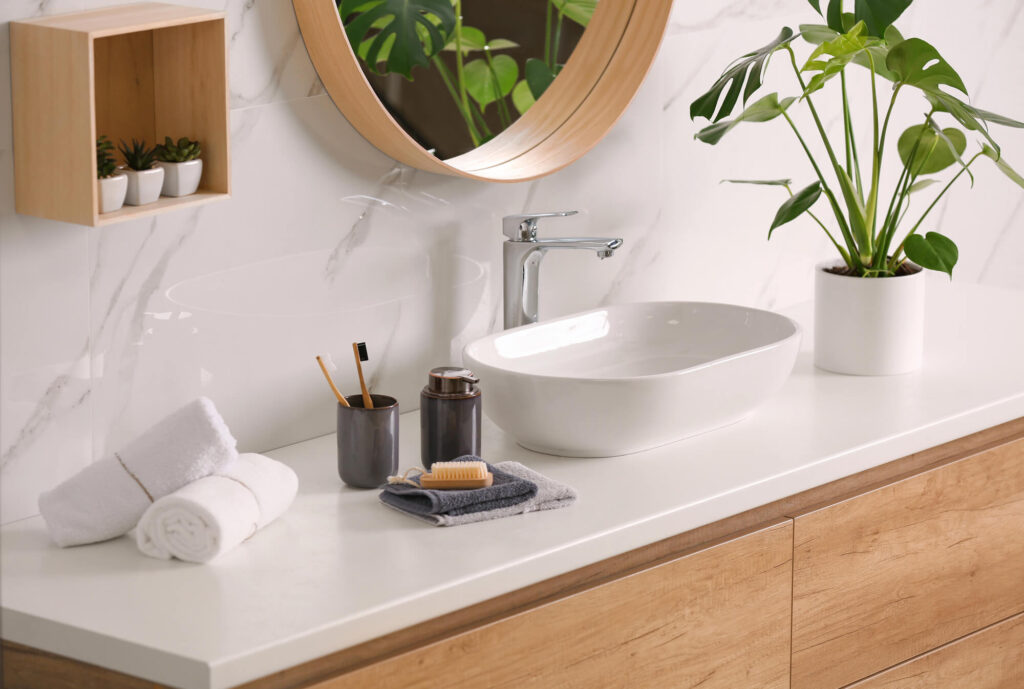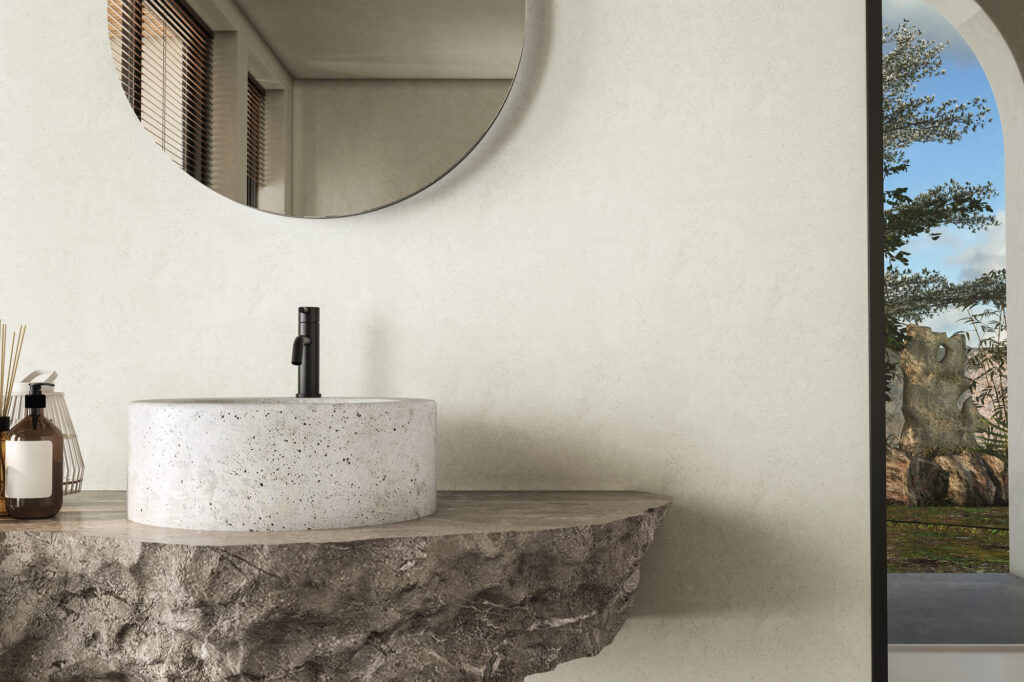When planning a bathroom remodel, few elements impact both function and style as much as your bathroom vanity’s countertop. Bathroom countertops aren’t just flat surfaces for holding your soap or toothbrush: they help define the aesthetic of the entire bathroom, influence how easy the space is to maintain, and can even affect your home’s resale value.
With a vast selection of countertop materials available—ranging from timeless natural stone like granite and marble to modern engineered options such as quartz and solid surface composites—homeowners now have more flexibility than ever before. The right countertop surface can enhance durability, match your vanity and bathroom faucets, resist water damage, and tie together your overall bathroom design.
In this post, you’ll find expert insights on the most popular bathroom countertop materials, explore the pros and cons of each, explain what to consider before you buy, and provide ideas for both budget-conscious and luxury remodels.
Why Your Choice of Bathroom Vanity Top Material Matters
Yes, choosing the material of your bathroom vanity countertop starts with considering the design and style, but it will end up being much more. Your vanity top is, above all, a key element that impacts both the functionality and longevity of your space. Selecting the right material will ensure your countertop withstands daily wear and tear, complements your bathroom decor, and aligns with your maintenance preferences.
Vanity Tops Must Be Functional While Stylish
Your countertop is a high-traffic work surface that should stand up to daily use. From toothpaste spills and denatured alcohol cleaners to hot curling irons and dripping bathroom faucets, your material choice must be ready for real life. A well-chosen countertop complements your sink, fits your bathroom tile ideas, and contributes to a cohesive design.
Resist Moisture and Heat
Bathrooms are inherently humid spaces. Steam from your shower, water splashes from the sink, and ambient moisture from daily use can wear down lesser-quality materials. That’s why sealing, refinishing, or choosing nonporous and moisture-resistant materials is critical.
For example, natural stone countertops may need regular sealing to prevent stains or mold growth, while solid surface and quartz countertops are often engineered to offer excellent resistance without as much upkeep.
The Type of Countertop Should Last and Be Durable
Your bathroom countertop should be a long-term investment. The wear and tear from makeup spills, cleaning products, and water exposure can break down some materials faster than others. Engineered quartz, epoxy resin, and granite countertops are known for their toughness, while laminate and tile countertops may show signs of wear sooner.
High-quality materials, especially when professionally installed, extend the lifespan of your bathroom and can help prevent early replacement.

Key Factors to Consider When Choosing Bathroom Countertop Materials
Choosing the best bathroom countertop material for your remodel means more than just picking a color or stone. It’s about finding the right blend of performance, price, and personality that aligns with your overall bathroom design goals. Here are some of the most important factors to evaluate before you finalize your selection.
Budget and Material Cost
The cost to remodel a bathroom can climb quickly depending on your materials, so your budget will heavily influence your options.
Premium surfaces like natural stone, granite, and quartz often come at a higher price point per square foot, while more affordable alternatives like cultured marble, tile, and laminate countertops offer aesthetic value without the premium cost.
Labor from a professional interior remodeling contractor and delivery from manufacturing plants may also add to your budget.
Don’t forget to account for:
- Installation fees
- Edge finishes
- Cutouts for sinks and faucets
- Sealing or finishing treatments
While some homeowners opt for a DIY project, working with professionals ensures correct seals, structural compatibility, and access to higher-end materials and a customer service guarantee.
Durability and Resistance
In a room where water damage, hot tools, makeup, and cleaning products are used daily, durability is key for your vanity tops. Materials like quartz and engineered stone offer high resistance to stains, scratches, and heat. On the other hand, marble countertops and soapstone require a little more care and ongoing refinishing to preserve their elegance.
Ask yourself:
- Will kids or guests use this bathroom?
- How often will it be cleaned or maintained?
- Will it be subject to frequent spills, scratches, or moisture?
For low-maintenance longevity, solid surface and quartz tend to lead the pack.
Maintenance and Sealing Needs
Bathrooms are wet environments, and any countertop in that space should be ready to handle frequent exposure to water and humidity. Nonporous choices like solid surface, quartz countertops, and some composite materials are water-resistant and don’t need sealing.
However, if you’re leaning toward natural stone—including travertine, granite, or marble—you’ll need to commit to regular sealing to prevent stains, mold, or deterioration.
A good rule of thumb:
- Quartz and solid surface = minimal sealing required.
- Natural stones like marble, soapstone, and travertine = regular maintenance.
- Tile countertops = require upkeep of grout lines.
- Concrete countertops = periodic sealing to avoid cracks and discoloration.
Style and Compatibility with Design Vision
Your countertop should enhance your vanity and work harmoniously with your chosen bathroom tile, backsplash, and fixtures. From warm, earthy tones of natural stone to sleek, modern bathroom looks with glossy solid surface finishes, your vanity top plays a major role in bringing your design to life.
Compatibility with Sink Types and Plumbing
Your sink choice may determine what countertop material you should go with. For example, undermount sinks require materials with a solid edge, like granite, solid surface, or quartz.
Materials like tile or laminate may not support undermount installation as easily without reinforcement.
Additionally, consider whether your remodel involves plumbing updates, as that could influence the choice of both countertop height and cutout customization.
Environmental Impact and Sustainability
Eco-conscious homeowners can now choose eco-friendly materials such as recycled composite surfaces or solid surfaces made using Microban, which offers antibacterial protection.
Top Bathroom Countertop Materials Compared
There’s no one-size-fits-all solution when it comes to bathroom countertop materials. Each option offers a unique blend of aesthetics, durability, and functionality. Below is a detailed comparison of the most popular choices in today’s market, helping you select a surface that complements your bathroom design and lifestyle.
Quartz
Quartz is one of the most popular choices for modern bathroom remodeling projects. It’s an engineered stone countertop made of natural quartz crystals combined with resins, which makes it nonporous and highly durable.
- Pros: Low maintenance, stain-resistant, no sealing required, wide range of colors and patterns, uniform appearance.
- Cons: Higher cost than some materials, not heatproof.
- Best for: Homeowners looking for durability, elegance, and minimal upkeep in a luxury or high-traffic bathroom.
Granite
Granite remains a timeless favorite for bathroom vanity tops due to its natural beauty and strength. Every slab is unique, offering rich patterns and textures.
- Pros: Durable, heat-resistant, increases resale value, and has natural stone appeal.
- Cons: Requires sealing to maintain stain resistance, and heavier material may need reinforced cabinetry.
- Best for: Master bathrooms or bathrooms where a high-end, natural look is desired.
Marble
Marble countertops offer unmatched elegance and a classic aesthetic. However, like other natural stone countertops, they require more care than other materials.
- Pros: Stunning veining, timeless beauty, great for upscale bathrooms.
- Cons: Prone to staining and etching, needs regular sealing, and can scratch easily.
- Best for: Low-traffic bathrooms or homeowners who don’t mind regular maintenance.
Cultured Marble
A cost-effective alternative to natural marble, cultured marble is a blend of marble dust and resin, often pre-formed to include integrated sinks.
- Pros: Affordable, seamless design, available in many finishes, resistant to mildew.
- Cons: Less durable than natural stone, susceptible to scratches, and cannot withstand high heat.
- Best for: Guest bathrooms or budget-conscious remodels.
Solid Surface (e.g., Corian)
Solid surface countertops offer a clean, contemporary look and excellent customization.
- Pros: Seamless integration with sinks, easy to clean, stain-resistant, and a wide range of colors.
- Cons: Not as heat- or scratch-resistant as stone, can be damaged by sharp objects.
- Best for: Sleek, modern bathroom designs or custom vanity configurations.
Laminate
Laminate remains a popular budget-friendly surface material option. Today’s high-definition laminate designs can convincingly mimic more expensive materials.
- Pros: Very affordable, wide selection of styles, DIY-friendly, low maintenance.
- Cons: Less durable, not heat-resistant, prone to scratching and peeling over time.
- Best for: Powder rooms or secondary bathrooms with low moisture exposure.
Tile
Tile countertops allow for a custom, artisan look. Available in a range of shapes, colors, and materials, including ceramic, porcelain, and glass countertops.
- Pros: Inexpensive, highly customizable, and easy to replace individual tiles.
- Cons: Grout lines require sealing and regular cleaning, uneven surface, may be prone to cracking.
- Best for: Vintage or artistic bathroom themes, DIY remodels.
Concrete
Concrete slabs are becoming increasingly popular in contemporary designs, just like with kitchen countertops.
- Pros: Fully customizable, industrial or modern look, can be tinted or textured.
- Cons: Requires sealing to prevent staining, may crack over time, and is a heavier installation.
- Best for: Modern or rustic bathrooms where a one-of-a-kind statement is desired.
Soapstone
Soapstone is a natural stone that develops a rich patina over time. It’s soft to the touch and has a deep, matte appearance.
- Pros: Naturally nonporous, low maintenance, doesn’t require sealing.
- Cons: Softer than granite, may scratch or dent.
- Best for: Homeowners seeking a subtle, natural look with minimal upkeep
Sustainable and Eco-Friendly Countertop Options
Environmental consciousness is growing in the bathroom renovation industry. Many bathroom countertop materials now include eco-friendly features such as:
- Recycled materials: Some laminate and quartz options use recycled glass or stone.
- Forestry certifications: Wood countertops made under the Forest Stewardship Council (FSC) ensure responsible sourcing.
- Microban® technology: Some solid surfaces include antimicrobial protection for improved hygiene.
- Reduced environmental impact: Low-VOC adhesives and composite materials with green certifications are widely available.
These are popular surfaces with homeowners who want to reduce their carbon footprint without compromising style or performance.

Matching Countertop Materials to Bathroom Styles and Needs
Whether you’re remodeling a primary bathroom, powder room, or guest bath, here are some guidelines to help align your material choice with your design and lifestyle needs.
Modern and Luxury Bathrooms
If you’re looking for luxury bathroom design ideas, materials like quartz, marble, or even granite provide a polished and elegant look. These surfaces enhance resale value and complement high-end vanities, contemporary faucets, and undermount sinks.
Engineered surfaces also tend to work well with integrated storage and minimalist lighting solutions. Concrete slab countertops also lend themselves to industrial or minimalist styles.
Family or High-Traffic Bathrooms
Durability is key in shared or family bathrooms. Granite, solid surface, and laminate are all practical options.
These countertops withstand daily wear and tear, resist water damage, and are easier to clean, making them ideal for homes with kids or multiple users. Look for nonporous or sealed materials to prevent moisture absorption and mold growth around your sink or faucet.
Guest Bathrooms and Powder Rooms
For lower-traffic spaces, style can take priority over function. Cultured marble, tile, or even concrete slabs make an impression without requiring daily heavy-duty performance. These rooms are perfect opportunities to experiment with statement vanities, eco-friendly materials, or vintage-inspired bathroom design choices.
Cost, Installation, and Maintenance Considerations
When evaluating countertop materials, understanding the full cost—including installation and ongoing maintenance—is essential for a successful remodel.
Installation Costs and Labor
- Quartz and granite often involve higher labor costs due to their weight and need for professional tools.
- Laminate and tile are DIY-friendly, making them more accessible for budget-conscious remodelers.
- Custom installations, like concrete or soapstone, may require special manufacturing plants or experienced fabricators.
Maintenance and Sealing
- Natural stones like marble and granite need sealing at least once a year to protect them from stains and etching.
- Engineered surfaces like solid surface, quartz, or laminate require minimal upkeep.
- Avoid harsh chemicals; denatured alcohol and water are typically safe for cleaning most bathroom countertops.
Long-Term Durability
- For maximum lifespan, prioritize resistance to scratches, heat, stains, and moisture.
- Evaluate whether your chosen material supports features like integrated sinks, backsplashes, or under-cabinet lighting.
- Ask your interior remodeling contractor about warranties or refinishing options, particularly with materials like epoxy or resin that can wear over time.
Choosing the Best Bathroom Countertop for Your Needs
Your bathroom countertop plays a major role in both the design and day-to-day functionality of your space. From durability and water resistance to color, texture, and compatibility with your sink, faucet, or vanity, choosing the right material is key to a successful bathroom remodel.
Whether you prefer the timeless elegance of marble countertops, the modern appeal of quartz, or the budget-friendliness of laminate, there’s a material to fit every aesthetic, price point, and bathroom layout.
At A to Z Bathroom Remodeling, our team of experts helps you navigate the many bathroom countertop materials available to find a solution that perfectly aligns with your needs and vision.
From selecting materials at our showroom to professional installation with high-standard craftsmanship, we’re your partner in bringing your dream bathroom to life. Contact us today to get started on your bathroom renovation.
